Minority Homeownership Gaps:
Why do they exist and what can we do to shrink them?
For generations, homeownership has been one of the primary ways people build wealth, stability and community – but for far too many families, this path is full of barriers. In Memphis and cities throughout the country, systemic obstacles have contributed to these gaps in homeownership for Black and POC communities.
According to 2023 U.S. Census data, white Americans had a homeownership rate of 73.8%, while Black and Latinx Americans remained below 50%. This disparity is even wider today than it was in 1960 when redlining and overt discrimination in housing were still legal. In Memphis, the gap is even wider. As of 2020, only 43.9% of Black residents in the city owned their homes, compared to the 74.3% of white residents (Urban Institute) – a gap that reflects decades of economic and social inequality.
But, why does this gap exist?
Racially discriminatory practices like redlining, predatory lending and zoning laws have historically denied Black and POC families from the same access to financing, stable neighborhoods and rising home values. Unfortunately, these practices did not end with the Fair Housing Act of 1968; they evolved.
For example, Black neighborhoods are still more likely to face lower appraisals, subprime loans and disinvestment. In Memphis, the 2005-2007 foreclosure crisis disproportionately affected Black neighborhoods as families lost homes, wealth and security due to outside investors buying out properties and renting them back at higher costs.
Today, minority borrowers continue to face unequal access to mortgage loans and banking services. According to the Urban Institute study, only 1% of Black households and 2% of Black renters applied for a mortgage. These numbers not only reflect financial disparities, but also limited access and distrust in traditional banking services. This is compounded by the financial burden of renting.
Renters, especially in low-income communities of color, are spending more of their income on housing than ever before. As rent continues to rise and wages stay the same, it becomes even harder for families to save for a down payment, let alone qualify for a mortgage. High rental costs also mean fewer opportunities to build credit or generate the kind of wealth that makes homeownership possible.
Another factor that plays a major role is the availability and condition of affordable housing. In Memphis, aging housing stock is concentrated in traditionally Black neighborhoods and much of it is left uninhabitable without significant renovations. Meanwhile, outside investors have purchased more than 7,000 single-family homes in Shelby County over the last two years. These homes are often turned into rentals, Airbnbs or sold at an unattainable price.
So, what can we do?
Shrinking the homeownership gap requires action – and that is what United Housing is working to do in Memphis and beyond. Here’s how:
Homebuyer Education: Understanding credit, budgeting and the homebuying process is crucial. That is why we offer HBE classes monthly to educate and empower families with the tools they need to become homeowners.
Support housing development: We invest in real estate that makes sense, including single-family starter homes, duplexes and multifamily units to offer a path to affordable homeownership. These types of properties support various dynamics – from individuals to multigenerational families – while also building equity and stability for buyers.
Rehabilitate housing stock: Part of our mission is to invest in our community. By making strategic investments in rehabilitating older homes, we can help restore value in underinvested neighborhoods and put more quality, affordable homes on the market for local buyers, not outside investors.
Expand access to lending: UHI partners with local financial institutions to help provide access to equitable mortgage lending, down payment assistance and financial incentives for first-time homebuyers. Convergence Memphis, a subsidiary of UHI, works to address these challenges by partnering with policymakers, lenders and real estate professionals to prioritize homeownership for Memphis residents, primarily those of color.
Homeownership is about more than owning a property – it’s about opportunity and stability. The racial gap in homeownership is not just a reflection of economic inequality; it is a cause of it. If you are a prospective buyer, housing advocate or real estate professional looking to partner and help close the homeownership gap, contact United Housing today. Together, we can make a difference.
